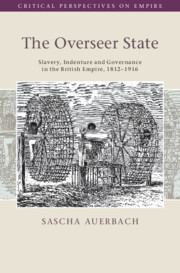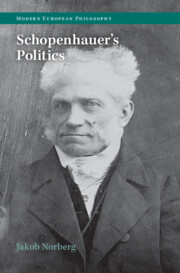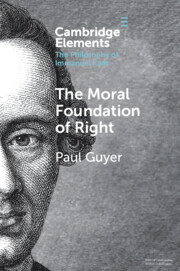Refine search
Actions for selected content:
66 results
Sixth Collection
- from Letters for the Advancement of Humanity
-
- Book:
- Johann Gottfried Herder: Letters for the Advancement of Humanity
- Published online:
- 13 December 2025
- Print publication:
- 22 January 2026, pp 267-324
-
- Chapter
- Export citation
1 - Introduction
-
- Book:
- States of Transition
- Published online:
- 31 October 2025
- Print publication:
- 13 November 2025, pp 1-24
-
- Chapter
- Export citation

Shapes in Revolution
- The Political Morphology of Cuban Life
-
- Published online:
- 07 November 2025
- Print publication:
- 20 November 2025
Chapter 10 - British Idealism
- from Part IV - Victorian Anti-naturalism
-
- Book:
- Modern Moral Philosophy in the Nineteenth Century
- Published online:
- 15 November 2025
- Print publication:
- 30 October 2025, pp 271-294
-
- Chapter
- Export citation
6 - NJMs and the Conflicting Roles of the State
-
- Book:
- Global Business and Local Struggle
- Published online:
- 18 July 2025
- Print publication:
- 07 August 2025, pp 170-196
-
- Chapter
- Export citation

The Overseer State
- Slavery, Indenture and Governance in the British Empire, 1812–1916
-
- Published online:
- 21 March 2025
- Print publication:
- 27 March 2025
Conclusion: A Reckoning
- from Part V - The Rival Views in Contestation
-
- Book:
- Liberty as Independence
- Published online:
- 23 January 2025
- Print publication:
- 06 February 2025, pp 276-280
-
- Chapter
- Export citation
Chapter 5 - Schopenhauer’s Polemics
-
- Book:
- Schopenhauer's Politics
- Published online:
- 09 January 2025
- Print publication:
- 23 January 2025, pp 159-201
-
- Chapter
-
- You have access
- Open access
- HTML
- Export citation
Chapter 2 - The World as War
-
- Book:
- Schopenhauer's Politics
- Published online:
- 09 January 2025
- Print publication:
- 23 January 2025, pp 71-99
-
- Chapter
-
- You have access
- Open access
- HTML
- Export citation

Schopenhauer's Politics
-
- Published online:
- 09 January 2025
- Print publication:
- 23 January 2025
-
- Book
-
- You have access
- Open access
- Export citation

The Moral Foundation of Right
-
- Published online:
- 04 December 2024
- Print publication:
- 16 January 2025
-
- Element
- Export citation
Conclusion
-
- Book:
- History in Flames
- Published online:
- 22 August 2024
- Print publication:
- 22 August 2024, pp 179-188
-
- Chapter
- Export citation
Chapter 1 - Introduction
-
- Book:
- Freedom and Power in Classical Athens
- Published online:
- 04 April 2024
- Print publication:
- 11 April 2024, pp 1-17
-
- Chapter
-
- You have access
- Open access
- HTML
- Export citation
Chapter 4 - Power and the Citizen
-
- Book:
- Freedom and Power in Classical Athens
- Published online:
- 04 April 2024
- Print publication:
- 11 April 2024, pp 88-135
-
- Chapter
-
- You have access
- Open access
- HTML
- Export citation
Bringing the Constituents Back In: The Politics of Social Security in the 1950s
-
- Journal:
- Journal of Policy History / Volume 36 / Issue 2 / April 2024
- Published online by Cambridge University Press:
- 14 March 2024, pp. 161-190
-
- Article
-
- You have access
- Open access
- HTML
- Export citation
Compared to what?: Setting American political development in comparative context
-
- Journal:
- Social Science History / Volume 48 / Issue 2 / Summer 2024
- Published online by Cambridge University Press:
- 11 March 2024, pp. 361-382
- Print publication:
- Summer 2024
-
- Article
-
- You have access
- Open access
- HTML
- Export citation
2 - Political Action and Valuable Institutions
- from Part I - Political Community
-
- Book:
- Statehood as Political Community
- Published online:
- 15 February 2024
- Print publication:
- 22 February 2024, pp 48-69
-
- Chapter
- Export citation
Conclusion
- from Part II - Stability, Legitimacy, and Democracy
-
- Book:
- Statehood as Political Community
- Published online:
- 15 February 2024
- Print publication:
- 22 February 2024, pp 223-236
-
- Chapter
- Export citation
6 - The State, Civility, and International Humanitarian Law
-
-
- Book:
- Civility, Barbarism and the Evolution of International Humanitarian Law
- Published online:
- 11 January 2024
- Print publication:
- 01 February 2024, pp 111-134
-
- Chapter
- Export citation
1 - Theory of Intersectional Advocacy
-
- Book:
- Intersectional Advocacy
- Published online:
- 05 January 2024
- Print publication:
- 04 January 2024, pp 25-45
-
- Chapter
- Export citation
